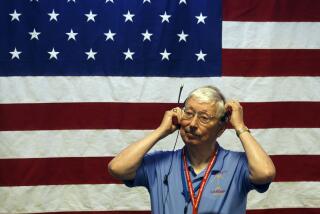Shuttle Probe Chief: Calm in the Face of Calamity
- Share via
HOUSTON — As the man who must find out--and then explain--what caused the Challenger space shuttle to explode, Jesse Moore seems well suited for the job.
The 46-year-old South Carolina native is a man with a reputation for straight talk and long hours in the office.
Facing an unrelenting barrage of tough questions, he must at the same time stonewall anything that smacks of premature speculation about the cause of the catastrophic explosion Tuesday that killed six astronauts and a schoolteacher--the first private American citizen chosen to venture into space--in the worst accident in the history of space exploration.
Moore was named only last Thursday as director of the Johnson Space Center in Houston. He will continue, however, as the space shuttle administrator of the National Aeronautics and Space Administration until May.
“He’s as competent as anyone we’ve had in there,” said a staff member of a congressional subcommittee that deals frequently with Moore and other NASA officials. “His reputation is outstanding.”
Stony-Faced Image
A man who spends his off hours with his family, Moore presents an almost stony-faced public image, rarely smiling at shuttle briefings, even those that have gone flawlessly from start to finish. He gives the appearance, at least, of always being in control.
“He’s certainly not someone who buckles under pressure,” said NASA spokesman Charles Redmond. “If he was, he wouldn’t be the kind of man needed in the shuttle program.”
But he also said that Moore’s lack of flamboyance has often been a plus.
“I have heard him only rarely angry in the last six years I have known him, but his anger was directed at situations, not individuals,” he said.
Born in 1939 in Newberry, S.C., Moore earned his bachelor’s and master’s degrees in engineering from the University of South Carolina in 1961. His first job was with General Dynamics, working on guidance systems for Navy missiles. He joined NASA at the Jet Propulsion Laboratory in Pasadena in 1966 and moved to the space agency’s headquarters in Washington in 1978.
He became the director of the space shuttle program in 1984.
Organized Investigative Teams
Moore, whose voice betrays no hint of his South Carolina upbringing, has spent the last two days working around the clock, organizing teams to examine everything from recovered spacecraft debris to the telemetry of Challenger as it was arching toward space.
“I don’t think he’s had a minute’s worth of rest,” Redmond said. “He has been in and out of meetings that I would characterize as excruciating.”
Moore at the same time also has had to face the press, a role made difficult by the desire for immediate answers to questions that may require weeks or months of study to resolve.
At a briefing Wednesday morning, Moore repeatedly headed off questions about what might have made Challenger explode at 47,000 feet less than two minutes after launch.
“It’s just clearly too early for us to speculate,” he told reporters. “What we want to do at this point in time is to keep our options open and not take any actions that would preclude us from moving in a number of different ways as we try to assess the impact of the overall program.”
He said it was too early to discuss almost everything, from the long-term effects of the shuttle disaster to the sequence of events that led to the explosion. All that would come later.
“He’s in a position where he’s got to be very cautious, and that’s what he should say,” said the House staff member.
On Wednesday morning, he was asked his plans for the coming days. His answer was typical: “My personal plans are to spend as much time as I can understanding this operation.”
More to Read
Sign up for Essential California
The most important California stories and recommendations in your inbox every morning.
You may occasionally receive promotional content from the Los Angeles Times.













